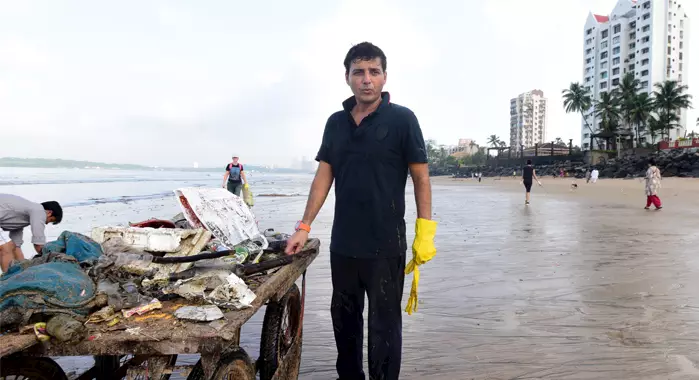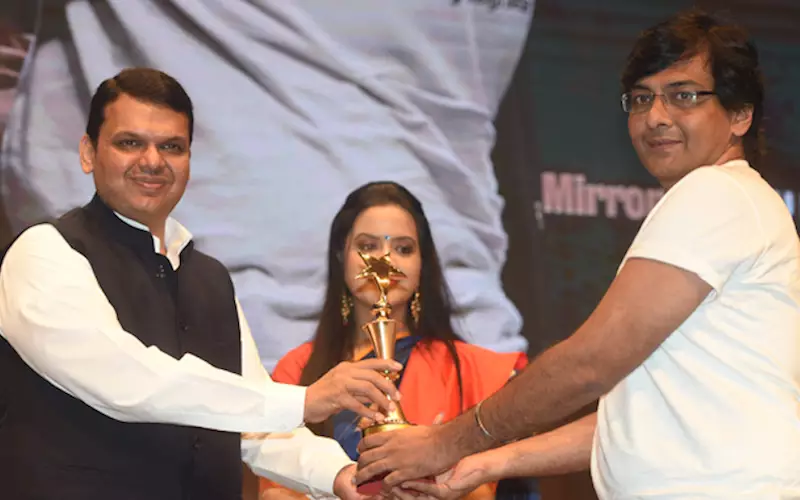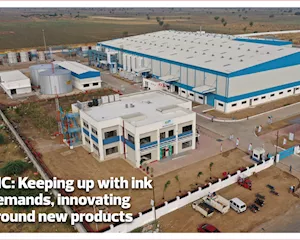Green heroes who combat plastic waste
Amidst talks on Swachh Bharat, we look at crusaders who combat the issues plagued by plastic and packaging waste generated by the city. Priya Raju reports
14 Oct 2017 | By Priya Raju
There is a Marathi one-act play by Pramod Shelar called Paani, Shudhtha Guranteed.
One of the things the earnest government official (the hero of the play) says is, the Ganga is among the five most polluted rivers in the world! Each day, 2.9 billion litres of wastewater from sewage, domestic and industrial sources are dumped into it. The earnest officer speaks NGO-lingo about "a transition to sustainable, adequate, eco-efficient infrastructure ... and producers receiving training in sanitation and hygiene education, latrine production, waste disposal, etc." But as the earnest government official does a back-breaking tour from the Himalayas, into Haridwar, even Yamuna (a tributary), Varanasi, Kanpur, Murshidabad and Kolkata, realisation dawns.
Be it, the first significant human pollution at Uttarkashi, seventy miles from the source of the holy river; to the Varanasi sewers and Kashi's crematoriums to Kanpur's tanneries trouble the hero. By the end of the play, he loses his mind in a pile of rotting flowers, plastic bags, faeces and human ashes; along with industrial waste from the units in Haridwar.
In that apocalyptic horror, Official Two replaces Official One who now counts among the living dead.
The official tour begins.
It's more of the same: dangerous water levels of chromium which trickle down into agricultural produce and even milk.
More of paper and plastic; and less of water.
Meanwhile on the latest and bestest video-conference platform, babus in Delhi grill government officials on the field about delays in executing public-works projects like the Swachh Bharat Abhiyan.
This is the short history of India's commitment to green projects as suggested by Paani, Shudhtha Guranteed.
It is all rather grim.
Even as the curtains came down, there was stunned silence.
No applause, no ovation.
Our future?
Save the Mumbai rivers
On 5 October, at the Royal Opera House in Mumbai there was applause.
Gopal Jhaveri of River March was felicitated by the 18th Chief Minister of Maharashtra, Devendra Fadnavis for trying to preserve and conserve Mumbai's rivers.
This is part of the newspaper Mumbai Mirror's to acknowledge the contribution of people, who have done a great deed for the city but have never been given their due.
Jhaveri, the 45-year-old environmentalist warns that Mumbai could lose much of it if it doesn't stop disruptive practices — rampant concretisation, encroachment of green zones, destruction of mangroves, misuse of rivers as sewers.
"Imagine a city where children have to wear masks every day and where there is catastrophic flooding every monsoon. You may have a lot of money, but what use it will have in such conditions?" he said.

Jhaveri has campaigned for a series of environmental causes in the past few years, but his most important battle is saving the city's severely polluted rivers. Mithi, Dahisar, Poisar, and Oshiwara rivers are all considered biologically dead. Jhaveri is one of the founders of River March, a citizens' action network which spreads awareness, conducts regular stream clean-ups, and offers solutions to government and municipal bodies to rejuvenate and conserve the rivers.
"The rivers have become nullahs because of the neglect by officials and the careless waste disposal methods of local residents, businesses and industries. So much plastic and untreated sewage end up in the rivers every day. The rivers are choking. Then we wonder why our city gets flooded after just a few spells of rains," Jhaveri said. "If we want to avoid a repeat of July 2005, we must act now."
The River March program
What is the modus operandi?
Two lakh citizens are part of the River March network which sees participation from 50 colleges in Mumbai. "Every Sunday, from 7 am to 11 am, our volunteers try to clean up a particular stretch of a river. In March and April, we removed 2 lakh kg of plastic from Poisar River," he said.
The citizens' network has been building relationships with communities living along the route of the rivers, teaching them best conservation and waste disposal practices. Renowned water expert Rajendra Singh has joined the group's inspections.
"Apart from garbage, construction debris, discharge from small industries and cattle carcasses are also dumped into the rivers and their tributaries. Encroachments that shrink the rivers' path are another headache. But we are trying to build consensus among residents, political leaders and city officials to get everyone on board to tackle every issue," Jhaveri said.
Jhaveri and other environment warriors have also focused efforts at Sanjay Gandhi National Park, winning a ban on plastic bags there. "When it comes to the environment, everything is linked — parks, rivers, beaches and the sea," he said.
During a morning walk in 2011, Jhaveri and his three friends stumbled upon a dead deer. They later learned that over 3 kg of plastic was recovered from its entrails. The episode became the trigger for the river conservation campaign.

Three green heroes
Afroz Shah rid the 2.7-km stretch of Versova Beach of five million kg of waste, and he still continues to keep a close eye on the beach.
Shah, who started the clean-up in October 2015, says he is not an environmentalist or a change-maker. “I don’t feel that way. The only thing I look forward to every week is cleaning my beach.” Over the last two years, though, thousands of Mumbaikars have been inspired by him, and the work his Versova Residents Volunteers (VRV) has been doing, and have begun similar campaigns across the city.
Then there is Green Souls. The team operates from a 30,000-sqft urban farm in Kharghar. They introduce organic farming, composting and sustainable living through tri-weekly "volunteer days" and monthly workshops. They also conduct workshops at building societies and schools. But the Kharghar sessions do more than spread awareness about ecologically sound practices -through these, over 7,000 people (volunteers, students and workshop participants) have transformed the previously unused and barren land into a pretty, chemical-free farm.
What makes it truly elevating is: the produce is distributed to cancer patients and their families. Also, as of 2017, the group has also composted 150 tonnes of biodegradable waste through these sessions.
And then there are: Erin Zaikis and Kenneth Desouza who have made hygiene a household word in slums and adivasi villages
A typical centre has three women grating the five-star soaps into colourful shavings. A table in one corner is covered with monogrammed, hardly-used bars, a small sample of their collection from 25 Mumbai five-star hotels. Pictures and labels explain the process through which these will be cleaned, dried and transformed into brand new bars of soap, which will then be distributed to children in slums, villages and tribal areas.
"In a month, we collect an average of 400 kg of soap — it depends on hotel occupancy, so it varies seasonally — and this translates into 3,000 bars for each of our centres," says Kenneth Desouza, managing trustee and director, Sundara. They currently have centres in Kalwa, Palghar and Pune.
"When I asked the children at a school where their soap was, they had no idea what I was talking about, even when I tried to mime it out. It was heart-breaking to see they didn't have access to something so basic. When I did a little more research, I discovered that in fact the need to use soap and the importance of hand washing — key to preventing diseases like diarrhoea and pneumonia — are not ingrained in so many. I'm not a doctor, but it seems like such a simple solution to preventing the spread of so many infectious diseases," Erin Zaikis said.
Conclusion
During the recently concluded PrintWeek India Awards Jury week, the discussion revolved around how ease of recyclability and disposability is impacting and reshaping packaging development and research. One initiative that the local and international brands can do is incorporate green and easily recyclable packaging material. For example, a single material can be used to create a packaging to ensure ease in segregation and disposability.
A case in point being the consistent increase in the production of PET (Poly Ethylene Terephthalate) alone for various applications. According to PACE (Packaging Association for Clean Environment) report, the PET market in India for bottles alone in the year 2016 was 9,00,000 tonnes per year. Also, India uses approximately 6.2 crore bottles each day. With these numbers, it has become important to build a strong network of recyclers in the country and avoid the buildup of toxic wastes as mentioned above.
Like Tetra Pak ensures all the post-consumer waste generated are collected and recycled into benches, etc. Plus the recyclers are educated on how the six layers of the cartons can be recycled.
Amidst concretisation, deforestation, rising chromium and waste levels in our rivers along with shrinking coastline, such tiny efforts are need of the hour.
These are just a few heart-warming stories.
Naturally, we need a million more stories to celebrate if the print and packaging industry is serious about green - and preserving this planet.

Mumbai Mirror - Mumbai Heroes initiative
Mumbai Mirror through its yearly Mumbai Heroes initiative celebrates people, who have done a great deed for the city but have never been given their due. It is an effort by the to pay respects to those crusaders who are silently making this city, this nation a much better place to live in. On 5 October 2017, at the Royal Opera House 25 such heroes were celebrated and recognised for their selfless acts.
With additional inputs from Mumbai Mirror














 See All
See All